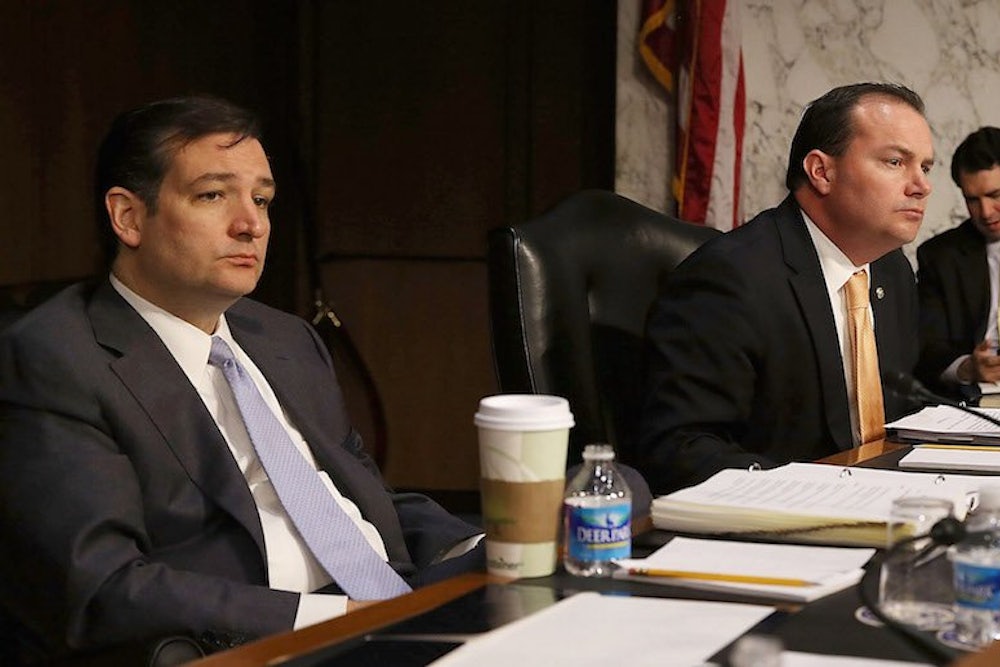Once the conservative legal strategy that gave rise to King v. Burwell got off the ground, Republicans in Congress probably had no choice but to become cheerleaders for, or active participants in, the ensuing litigation.
The imminence of the decision in the Obamacare challenge, expected from the Supreme Court sometime this month, is exposing the terrible predicament the entire strategy created for the party.
The problems Republicans will encounter if they win King—eliminating billions of dollars worth of insurance subsidies—are fairly clear and have been detailed at length. But it is also quite conceivable that the whole effort will boomerang on the GOP even if the government wins in King, and the federal subsidies survive for those states using federally facilitated exchanges. A number of persuasive legal arguments point to a victory for the government. But one of the most likely paths begins with the Court concluding that the Affordable Care Act statute is ambiguous—that both parties’ readings of the law are plausible—and that deference should go to the government.
As Chief Justice John Roberts suggested with his one and only question at oral arguments, this would leave the door ajar for a future presidential administration to reinterpret the statute, and discontinue the subsidies.
It’s difficult to fathom that any Republican president would turn off the subsidies quite as abruptly as the challengers want the Court to do. But if the government wins in this way—on what's known as the second step of the Chevron deference standard—it will create a new conservative litmus test for Republican presidential candidates. If elected, will you shut down the subsidies? I suspect most of the candidates will yield to pressure from the right and promise to do precisely that. Most immediately, this promise becomes a general election liability for the Republican primary winner. If that person becomes president, it will turn into an administrative and political nightmare, forcing states and the U.S. Congress to grapple with a completely elective policy fiasco.
King, as Josh Marshall noted recently, “is a wholly-owned subsidiary of the Republican Party.”
That the case was conceived by conservatives and endorsed by Republicans has created an extensive paper trail tying the GOP to the consequences of a decision for the challengers. It has also forced Republicans to playact as if they can and will fix the problems that flow from an adverse King ruling. Initially the idea was to foam the runway for conservative justices eager to void the subsidies; it has become an accession to the reality that the public will hold Republicans to account for the ensuing chaos.
Among the pitfalls of the extended charade is that Republican presidential candidates will reject and condemn proposals to clean up a King mess if they even resemble constructive solutions.
“Things can’t be turned on a dime,” Senate Majority Whip John Cornyn told Politico. “People can run for president, but we’ve actually got to solve a problem.” Cornyn may have been thinking of his fellow Texan Ted Cruz, who wants to use King as a pretext to repeal all of Obamacare. But his discomfort with Cruz' absolutism carries a whiff of inconsistency: Cornyn signed on to Republican briefs, first urging the justices to hear King and then asking them to void the subsidies. In January he eagerly anticipated that the Court would “render a body blow to Obamacare from which I don’t think it will ever recover.”
The promise of the King challenge has apparently faded since then. Republicans in Congress are quite likely incapable of solving the problem Cornyn was talking about in a way that pleases conservatives, and will be little better equipped if a Republican president discontinues the subsidies on his own. Six months ago, Republicans claimed excitedly that the path to repealing Obamacare outright ran through a victory in King. Now it seems that the best political outcome for Republicans would be to lose the case as conclusively and embarrassingly as possible.
